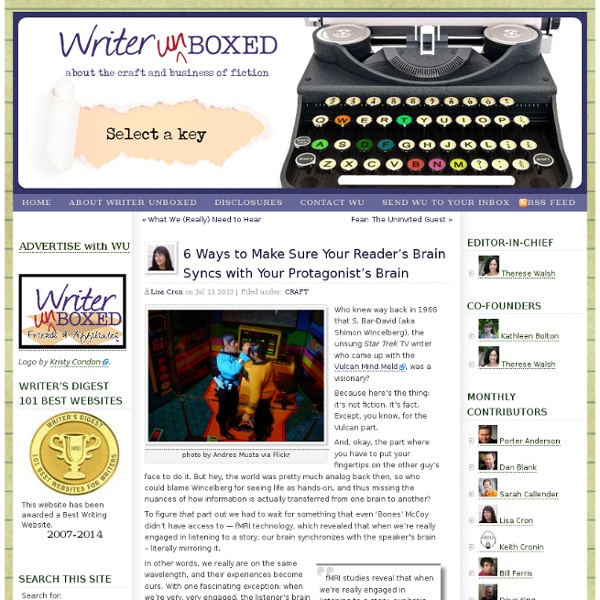How to Write with Style: Kurt Vonnegut’s 8 Keys to the Power of the Written Word
Find a Subject You Care About Find a subject you care about and which you in your heart feel others should care about. It is this genuine caring, and not your games with language, which will be the most compelling and seductive element in your style.
What is Dramatica? - Story Theory - Dramatica
So, what exactly is Dramatica? Dramatica is a whole new theory of Story. Because it wasn't based on any pre-existing theories, much of what it has to say can sound pretty unfamiliar. Still, the amazing part is that with each new concept you learn, whole new worlds of understanding and skill will open up to you. There are really only five central concepts that you'll need to know to understand all that follows.
Data Mining Novels Reveals the Six Basic Emotional Arcs of Storytelling
Back in 1995, Kurt Vonnegut gave a lecture in which he described his theory about the shapes of stories. In the process, he plotted several examples on a blackboard. “There is no reason why the simple shapes of stories can’t be fed into computers,” he said. “They are beautiful shapes.” The video is available on YouTube. Vonnegut was representing in graphical form an idea that writers have explored for centuries—that stories follow emotional arcs, that these arcs can have different shapes, and that some shapes are better suited to storytelling than others.
The Adverb Is Not Your Friend: Stephen King on Simplicity of Style
“Employ a simple and straightforward style,” Mark Twain instructed in the 18th of his 18 famous literary admonitions. And what greater enemy of simplicity and straightforwardness than the adverb? Or so argues Stephen King in On Writing: A Memoir on the Craft (public library), one of 9 essential books to help you write better.
Kids explain how banned and challenged books helped them and even saved their lives / Boing Boing
By Joan Bertin and Millie Davis Banned Books Week has come and gone but we can be sure of one thing: the coming year will be marked by challenges to the same kinds of books that were controversial this year, and in years past. report this ad
Show, Don't Tell: How to Show Not Tell in Writing With Examples
Learning how to show don’t tell in writing is one of the most difficult—and important—parts of writing when you first start. It’s what will give readers the coveted emotional attachment that forges true, long-lasting fans (and customers!). Part of writing and publishing a book successfully is ensuring you have the highest quality writing, and this rule of show don’t tell is crucial for that. When you start writing a book, it’s as if everyone around you becomes the expert.
10 books that will make you a better writer (and why)
Last week, I wrote about 25 habits that will make you a better writer. This week, I thought — let’s dive into books. After twenty-plus years writing, I’ve collected some resources that I absolutely couldn’t do with out. I love borrowing books.
Exercises for Story Writers
English 50 – Intro to Creative Writing: Exercises for Story Writers Basic Theory: What is a short story?
Iraqi Refugee Empowers Youth To Share Their Stories With 'Narratio'
When Ahmed Badr was 8 years old, his family fled Baghdad in the midst of the Iraq War. Writing helped him process his experience, so he started the website Narratio to give other young people the same opportunity. Ariel Edelman hide caption toggle caption Ariel Edelman When Ahmed Badr was 8 years old, his family fled Baghdad in the midst of the Iraq War.
Creative Writing
These OWL resources will help you with the basics of creative writing. This section includes resources on writing poetry, fiction, and creative nonfiction. Fiction Writing Basics
The Craft of Character Development
Aimie K. Runyan As an author of historical fiction, my work must—almost by definition—begin with a concept. Am I going to write a gritty saga about the women who flew as combat pilots for Russia in the Second World War (I did and it was great fun)? Am I going to write a sweeping fictionalized biography of Joan of Arc? A dark and twisty Tudor-era mystery?
General Fiction
Getting Around... Career Essentials Getting Started Queries & Manuscripts Market Research Classes & Conferences Critiquing Crafting Your Work Grammar Guides Research/Interviewing Writing Contests The Writing Business Income & Expenses Selling Reprints Collaboration Pseudonyms Negotiating Contracts Setting Fees/Getting Paid Rights & Copyright Tech Tools The Writing Life The Writing Life Rejection/Writer's Block Health & Safety Time ManagementColumn: Ramblings on the Writing Life Fiction Writing - General General Techniques Characters & Viewpoint Dialogue Setting & DescriptionColumn: Crafting Fabulous Fiction
6 Easy Steps to Unforgettable Characters
By Laurence MacNaughton, @LMacNaughton Part of the How They Do It Series (Contributing Author) Readers will pick up your book because of the concept, but they’ll keep reading because of the characters. No matter what genre you write in, interesting characters are absolutely essential to a well-told story.



